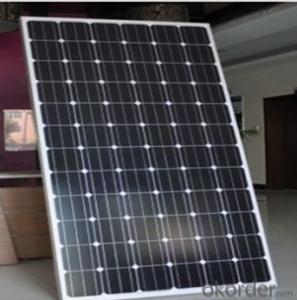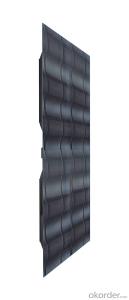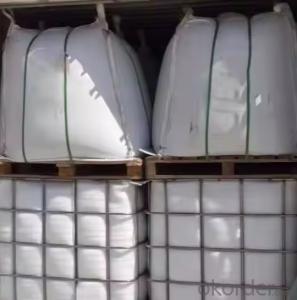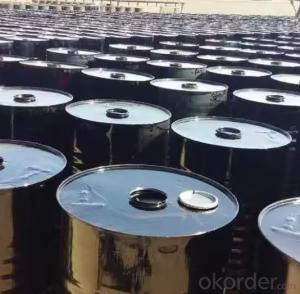45KW Solar Home Solution Approved by TUV UL CE
- Loading Port:
- Shanghai
- Payment Terms:
- TT OR LC
- Min Order Qty:
- 1 pc
- Supply Capability:
- 100 pc/month
OKorder Service Pledge
OKorder Financial Service
You Might Also Like
Item specifice
45KW Solar Home Solution Approved by TUV UL CE
Production description
PV array:
Convert sunlight instantly into DC electric power. Formed by the solar modules (also called photovoltaic
modules) in accordance with the system requirements for series and parallel.
Solar charge controller:
A charge controller may be used to power DC equipment with solar panels. The charge controller
provides a regulated DC output and stores excess energy in a battery as well as monitoring the battery
voltage to prevent over charge or over discharge. An inverter can be connected to the output of a charge
controller to drive AC loads.
Inverter:
Converts DC output power of photovaltaic soalr panels into standard AC power for use in the local off-grid
electrical network. It is a critical component in a photovoltaic system, allowing the use of ordinary
commercial appliances.
Battery banks:
Stores energy when there is an excess coming in and distribute it back out when there is a demand. Solar
PV panels continue to re-charge batteries each day to maintain battery charge.
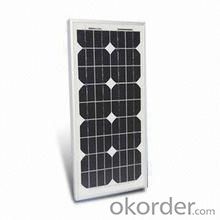
Feature
1.High conversion efficiencies resulting in superior power output performance.
2.Outstanding power output even in low light or high temperature conditions
3.Optimized design for ease of soldering and lamination
4.Long-term stability,reliability and performance
5.Low breakage rate
6.Color uniformaity
Physical characteristic
1. Rigorous quality control meets the highest international standards.
2. High-transmissivity low-iron tempered glass, strong aluminium frame.
3. Using UV-resistant silicon.
4. IS09001/14001/CE/TUV/UL
- Q:What is the average cost of a solar panel system?
- There are several factors that can influence the average cost of a solar panel system, such as the system's size, the panels' type and quality, installation expenses, and the need for additional equipment. Typically, a residential solar panel system costs between $15,000 and $25,000, not including any potential government incentives or rebates. However, it's worth noting that solar panel prices have been decreasing over time due to technological advancements and increased market competition. Moreover, the long-term advantages of solar energy, including lower electricity bills and environmental sustainability, often outweigh the initial investment. To obtain a more precise estimate based on your specific requirements and location, it is advisable to consult a solar panel installation company.
- Q:Can a solar energy system be installed in a historic building?
- Yes, a solar energy system can be installed in a historic building. However, the installation process may require careful planning and consideration to ensure that the historical integrity of the building is preserved. This may involve consulting with preservation experts, utilizing discreet mounting options, and integrating the system in a way that is visually unobtrusive.
- Q:What is the warranty period for solar energy systems?
- The warranty duration for solar energy systems can differ based on the manufacturer and the components of the system. Generally speaking, solar panels are accompanied by a 25-year warranty, ensuring their performance at a specific level throughout that time frame. On the other hand, inverter warranties typically span from 5 to 15 years. It's worth noting that the warranty period may vary between the product itself and the installation work, so it is crucial to thoroughly examine the warranty terms and conditions provided by both the manufacturer and installer. Ultimately, the warranty duration is crucial for guaranteeing the durability and dependability of solar energy systems, offering peace of mind to consumers.
- Q:How does the efficiency of solar panels vary based on the cleanliness?
- The efficiency of solar panels can vary based on their cleanliness. When solar panels are clean and free from dirt, dust, or debris, they can capture a higher amount of sunlight and convert it into electricity more effectively. Clean solar panels have a lower chance of being obstructed by dust particles, which can reduce the amount of sunlight they can absorb. Additionally, a buildup of dirt or grime on the surface of solar panels can create a barrier that prevents sunlight from reaching the photovoltaic cells, resulting in a decrease in their efficiency. Regular cleaning and maintenance of solar panels are essential to ensure optimal performance. By keeping solar panels clean, their efficiency can be maximized, leading to improved electricity generation. It is recommended to clean solar panels periodically, especially in areas with high levels of dust or pollution, or during seasons with increased pollen or debris in the air. By doing so, the solar panels can continue to operate at their highest efficiency, resulting in increased energy production and overall system performance.
- Q:How do solar energy systems affect the aesthetics of a building?
- Solar energy systems can impact the aesthetics of a building in both positive and negative ways. On one hand, well-designed solar panels can be visually appealing and can enhance the overall architectural design of a building. They can provide a modern and eco-friendly look, especially when integrated seamlessly into the structure. On the other hand, some people may find solar panels to be unsightly, especially if they are not properly integrated or if they significantly alter the original design of the building. Ultimately, the effect on aesthetics depends on the design, placement, and integration of the solar energy system.
- Q:Are solar energy systems expensive?
- Solar energy systems can be expensive to install initially, but they can save a significant amount of money on electricity bills in the long run, making them a cost-effective investment. Additionally, there are various financing options and government incentives available that can help reduce the upfront costs of installing a solar energy system.
- Q:What is the role of solar-powered ventilation systems in solar energy systems?
- The role of solar-powered ventilation systems in solar energy systems is to improve the overall efficiency and performance of the system. These ventilation systems help in regulating the temperature and air quality within the solar energy system, preventing overheating and reducing the need for additional cooling mechanisms. By utilizing the power of the sun, these ventilation systems provide sustainable and environmentally friendly solutions for maintaining optimal conditions in solar energy systems.
- Q:Can solar energy systems be used in areas with limited sunlight?
- Yes, solar energy systems can still be used in areas with limited sunlight. While solar energy systems are most effective in regions with abundant sunlight, advancements in technology have made it possible to harness solar energy even in areas with less sunlight. Additionally, solar panels can still generate electricity on cloudy days or during periods of reduced sunlight. However, the efficiency and output of solar energy systems may be lower in areas with limited sunlight compared to sunnier regions.
- Q:Can solar energy systems be used for powering air conditioning in commercial buildings?
- Yes, solar energy systems can be used to power air conditioning in commercial buildings. Solar-powered air conditioning systems, also known as solar thermal cooling systems, use the sun's energy to generate electricity or heat to power the air conditioning units. These systems are becoming more popular as they provide a sustainable and cost-effective alternative to traditional air conditioning methods, reducing the carbon footprint of commercial buildings.
- Q:Can solar energy systems be used in powering warehouses or distribution centers?
- Yes, solar energy systems can be used to power warehouses or distribution centers. Solar panels can be installed on the roofs of these buildings to convert sunlight into electricity, which can then be used to meet their energy needs. This can help reduce reliance on traditional energy sources and lower operating costs while also promoting sustainability.
1. Manufacturer Overview |
|
|---|---|
| Location | |
| Year Established | |
| Annual Output Value | |
| Main Markets | |
| Company Certifications | |
2. Manufacturer Certificates |
|
|---|---|
| a) Certification Name | |
| Range | |
| Reference | |
| Validity Period | |
3. Manufacturer Capability |
|
|---|---|
| a)Trade Capacity | |
| Nearest Port | |
| Export Percentage | |
| No.of Employees in Trade Department | |
| Language Spoken: | |
| b)Factory Information | |
| Factory Size: | |
| No. of Production Lines | |
| Contract Manufacturing | |
| Product Price Range | |
Send your message to us
45KW Solar Home Solution Approved by TUV UL CE
- Loading Port:
- Shanghai
- Payment Terms:
- TT OR LC
- Min Order Qty:
- 1 pc
- Supply Capability:
- 100 pc/month
OKorder Service Pledge
OKorder Financial Service
Similar products
New products
Hot products
Related keywords
